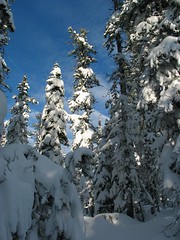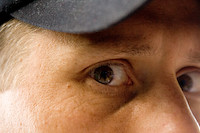Don't Move
 I’d be surprised if you didn’t know most of the details surrounding the search for the Kim family in southern Oregon a few weeks ago. I’d also guess that you now have an increased familiarity with Mt Hood that came from watching all manner of reports about snow caves, cell phone calls, and 50 mph winds.
I’d be surprised if you didn’t know most of the details surrounding the search for the Kim family in southern Oregon a few weeks ago. I’d also guess that you now have an increased familiarity with Mt Hood that came from watching all manner of reports about snow caves, cell phone calls, and 50 mph winds.But I wonder if you heard about a guy named Daryl Blake Jane? Jane was stranded in his Jeep Cherokee for 2 weeks. He set out for a town called Trout Lake, which is found on the flanks of Mt. Adams just a couple of hours from Mt Hood. Instead of taking a longer, well maintained highway, he chose to cut through the Gifford Pinchot National Forest. It was on a national forest road that his Jeep Cherokee got stuck in the snow. Unable to dig himself free, and recognizing the beginnings of a winter storm, he decided to wait it out. He rationed the rice cakes and banana chips he’d brought for snacks. To defrost the car he ran the engine for 7 minutes a day. For warmth he crawled inside his down sleeping bag. When his water ran out he drank from puddles.
And to improve his odds of survival, he stayed put.
It sounds so simple, but when you are alone and stranded, the urge to take rescue into your own hands is mortally tempting. The chilling fact is: you will be found. The question is: will you still be alive? Your chances of staying alive are increased when you don’t move, you find or build shelter, and you make your location visible to rescuers.
Jane followed most of these survival techniques during the 2 weeks he lived in his Jeep. His family was convinced he was on that national forest road, but when air searches by local law enforcement did not turn up any signs, law enforcement called off the search. Jane’s family persevered and worked with constituents of a local, snowmobile club to perform a ground search of the road. On the 14th day of his ordeal, Daryl Blake Jane was found by members of his own family. Exhausted and hungry, Jane was taken to a hospital where no injuries—not even frostbite—were detected.
I can only imagine how hard it must have been for Jane to stay in his Jeep. To suppress the urge to hike down the road and rescue himself took heroic willpower. I am convinced that is what kept him alive. I think I’ll remember his plight if I am ever put in a situation like that.


12 Comments:
That's true. I guess I look at all the people who become lost in our area and ask the same questions. Why don't they stay put? Why do they leave a main road?
Or, why don't they walk a short distance and then return back to their car?
I guess we panic and begin to forget the basics.
Ron
One point I failed to discuss, Ron, is that the media skews our perception of these incidents. We only hear about the cases where things are going horribly wrong because so little time is spent reporting the boring stuff where someone was found after sitting in their car. The high profile cases where people do the wrong thing, are probably in the minority.
Which begs the question: why do we only hear about the bad stuff?
Come in close and I'll whisper the answer...because that is what we like to watch.
The news folks know we get addicted to these tragic stories and they give us what we want.
I'm keeping my XC skis in the car from now on.
toucing story...quite touching.
Before I set foot in Vietnam, the USAF provided me with 3 Survival Schools; one classroom and 2 "hands on" type. The smart traveler will carry the "10 essentials", extra food & water... just "in case". My training was very valuable; not that I have ever had to use it, but because I've had opportunity of teaching much of it to the Boy Scouts the past 20 years. But no matter how much we can talk about carrying a "survival kit" in your car, how many people would REALLY do that? "I am NOT going to NEED ONE", said the confident traveler.
Good theory aside, one big difference I see between the guy in the Jeep and the Kim story is that he was alone; self-preservation was his only care. After nine days of watching one's wife and children dying, action beyond waiting may very well be required. Why didn't he return as planned after a few hours? Who knows - disorientation? a bear in the bushes? the thought of his wife and children needing him to be the hero who makes every effort to save them? Getting out of his car may be exactly what he needed to do. The legacy he left his children - that he would give up his life to save theirs - is an incredibly healing oinment for their loss.
Wow, Kristi we landed in some pretty different places on this. I hope you are still my friend after reading this.
I can’t let you get away with calling it a "good theory", when in fact, it is the truth. Staying put during a rescue situation is the best thing that you can do. The Kim story proved it. The Jane story proved it. It is well documented by survival experts that your rescue is jeopardized when you move from your location. Every step you take increases the size of the search grid. I cannot stress this enough, because I want everyone I know to be aware of this fact and stay put.
Romanticizing the actions of James Kim, in my opinion, may endanger a future victim.
I hear from your questions that you are very thoughtful about the events that played out in the Kim’s car and the future effects this will have on the children. I admit, (in my post even), that staying put is not an easy thing to do. I don’t want to make light of their struggles, (which is why I spent my post detailing the Jane saga), but one of us may find ourselves in a similar situation one day, and I want to have the best plan ready.
I’m sure that James’ family’s health weighed heavily on him, but his decision did not improve their situation. His focus should have been keeping them alive until they could be found. He could have located and purified water, found food, and gathered wood for more warmth and signal fires. His choice to attempt walking out of a location so remote that searchers had not located them in 9 days was foolish. What did he hope to accomplish? His girls weren’t dying, in fact, they lived 2 more days after he left, and could have lived longer with water and warmth.
Of course we're still friends! Sorry for the emotional response. I feel sensitive towards all of the criticism that arises towards the participants after such situations. Asking questions in order to learn from others is important, I know. Inwardly, though, I am shouting (not to you - to whomever), "You weren't there! You don't know! Just let them go in peace".
Stay put - yes. Don't drive on logging roads in the winter - yes. Build a snowcave when lost on Mt. Hood - yes. Stay together - yes. Take a locator beacon - yes. All the right moves.
Questioning the motives and actions of a man who just gave up his life to save his wife and small children or the experienced guys who climbed our little mountain or whomever else - doesn't work so well for me.
Okay, one more thing... :-)
Staying put is the first best option. I don't believe it can be an absolute rule. There are plenty of cases, some rather famous, of survival happening because people made the best choice that they could based on the conditions and information they had available at the time - which meant moving. The guy left for dead in Touching the Void. The soccer team depicted in Alive. The guy who cut his arm off when stuck in the rock. Castaway - okay, that's not a real story, but I'm so glad he finally tried to get off the island!
My winter travel kit - citybound or otherwise - contains water, chains, gloves, tie-downs, light snowshoes (why not? =), a first-aid kit, some energy bars, an emergency blanket. Missing are flares and a compass (the latter in my go-bag), and probably a few other things. Dry socks, maybe.
Mike, I'd love to hear your list! I have a friend that's a flight surgeon that just went through the survival school - I'll have to ask him.
Great points Kristi.
I guess the shouting going on inside of me was saying, "Don't forget about the guys who do it right. Who stay in their cars and get rescued." Lets hear just a little more about them.
As far as rescuing yourself by moving, your examples are well taken, and are actually some of my favorite stories. I'd say the question they must have faced was: is anyone looking for me? If so, I should stay where I can be found. If not, I should probably try to get out of here on my own.
Aron Ralston had spent his last 3 days pinned beneath the rock drinking his own urine to survive--he was pretty sure no one was coming.
Joe Simpson knew that Yates was going to report him dead back at basecamp, he knew no one was coming.
And Tom? He'd been on that island for 3 years, no one was looking for him. (Plus I'm not so sure he had survival as his first motive, but I digress.)
If I'm out for a 14 day backpacking trip and get lost, somehow without my pack on day 2, you'd better believe that I'm not staying put for 12 days so that a search can start.
But if I'm stuck on a road in the snow and my scheduled arrival time has passed, I'm going to trust the ones I love to do nothing short of hire a private helicopter pilot to come and find me.
And you can rest assured that I will do the same for you and Al--even if he does have tie-downs. So stay put, ok?
Sounds good! This is a good reminder to let people in on your plans when headed out to the snowy lands.
Thanks for the good conversation!
Post a Comment
<< Home